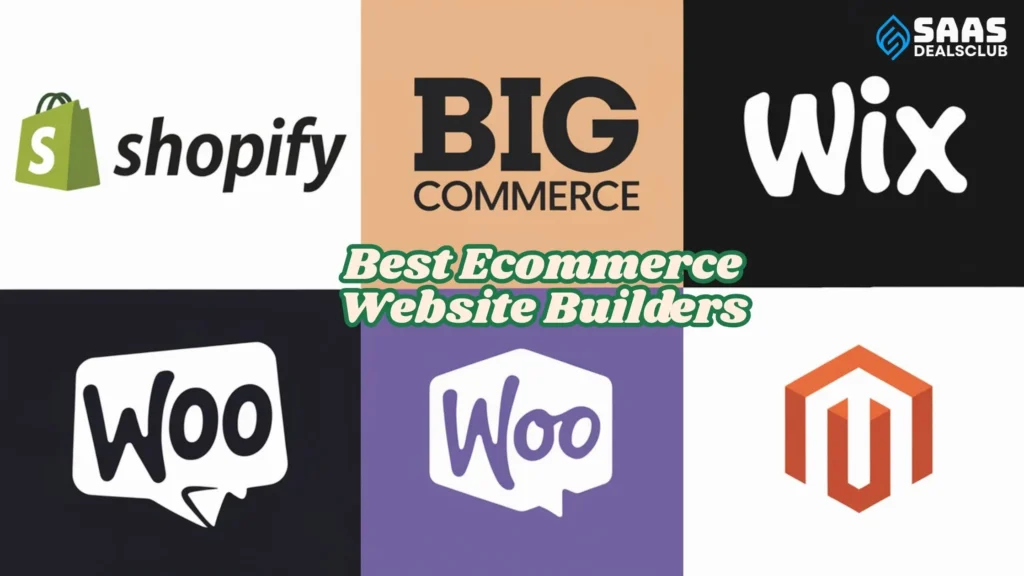Building an ecommerce website can be daunting. With the right tools, it becomes much easier.
In today’s digital age, having a strong online presence is crucial for any business. An ecommerce website acts as the front door to your online store, inviting customers to explore and purchase your products. But not everyone has coding skills to create a website from scratch.
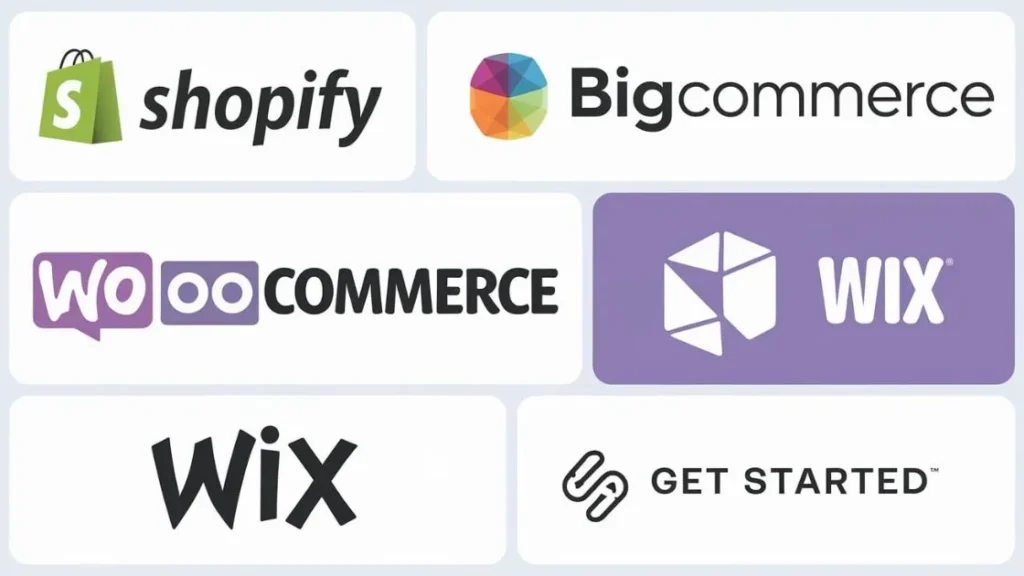
This is where ecommerce website builders come in handy. They provide user-friendly platforms with templates and features that make setting up an online store a breeze. Whether you’re a small business or a large enterprise, these builders offer solutions tailored to your needs.
In this guide, we’ll explore some of the best ecommerce website builders available, helping you find the perfect match for your business.
“Wix is the best website builder for ecommerce, because it offers an impressive selection of features, robust email marketing to reach new customers, and seamless integration between in-store and online purchases, thanks to its own POS products, alongside 24/7 customer support.”
Table of Contents
ToggleShopify
Shopify is one of the best eCommerce website builders available today. It provides a complete solution for anyone wanting to create an online store. With Shopify, users can set up their store, manage products, and process orders efficiently.
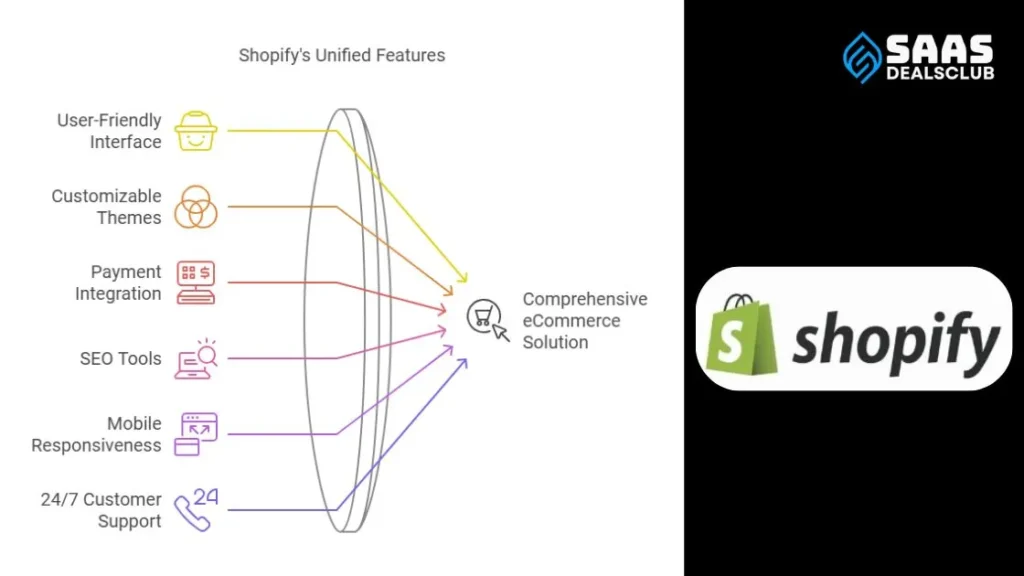
Key Features
Shopify offers a range of features that make it a top choice for eCommerce.
- Easy to Use: The platform is user-friendly, even for beginners.
- Customizable Themes: Choose from many professional themes and templates.
- Payment Gateway Integration: Supports multiple payment gateways.
- SEO Tools: Built-in SEO features to help your store rank better.
- Mobile Responsiveness: All themes are mobile-friendly.
- Customer Support: 24/7 customer support via chat, email, and phone.
Pros And Cons
Every platform has its strengths and weaknesses. Here is a breakdown of Shopify’s pros and cons:
| Pros | Cons |
|---|---|
| User-Friendly Interface: Simple to navigate and manage.Scalable: Suitable for small to large businesses.Excellent Support: 24/7 support helps resolve issues quickly.App Store: Access to numerous apps for added functionality. | Transaction Fees: Charges fees unless you use Shopify Payments.Monthly Costs: Higher plans can be expensive for small businesses.Limited Customization: Some advanced features require coding knowledge.App Costs: Some useful apps come with extra costs. |
Wix
Wix is a popular choice among ecommerce website builders. It offers a user-friendly interface and a wide range of features. With its drag-and-drop editor, even beginners can create stunning online stores without coding knowledge.
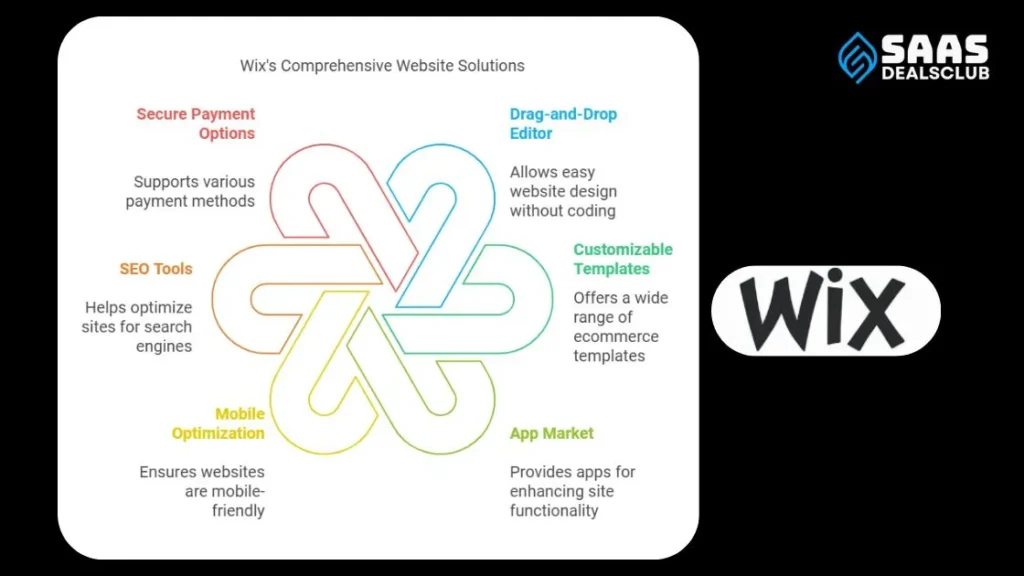
Key Features
- Drag-and-Drop Editor: Easily design your website without any coding skills.
- Customizable Templates: Choose from hundreds of templates tailored for e-commerce.
- App Market: Enhance your site with apps for marketing, sales, and more.
- Mobile Optimization: Your site will look great on all devices.
- SEO Tools: Optimize your site for search engines to attract more traffic.
- Secure Payment Options: Accept payments through various methods like PayPal, credit cards, and more.
- Analytics and Reports: Track your store’s performance with detailed analytics.
Pros And Cons
| Pros | Cons |
|---|---|
| Easy to Use: Ideal for beginners with no technical skills.Flexible Design: Highly customizable templates.Comprehensive App Market: Add extra features easily.SEO Friendly: Built-in tools to improve your site’s visibility. | Limited Scalability: It might not be suitable for very large stores.Template Switching: You cannot change templates without rebuilding the site.Transaction Fees: Charges a fee for each sale made through the platform. |
Bigcommerce
BigCommerce is a leading eCommerce platform. It helps businesses create online stores. This builder is known for its scalability and diverse features. Both small startups and large enterprises use BigCommerce. This makes it a versatile choice for many.
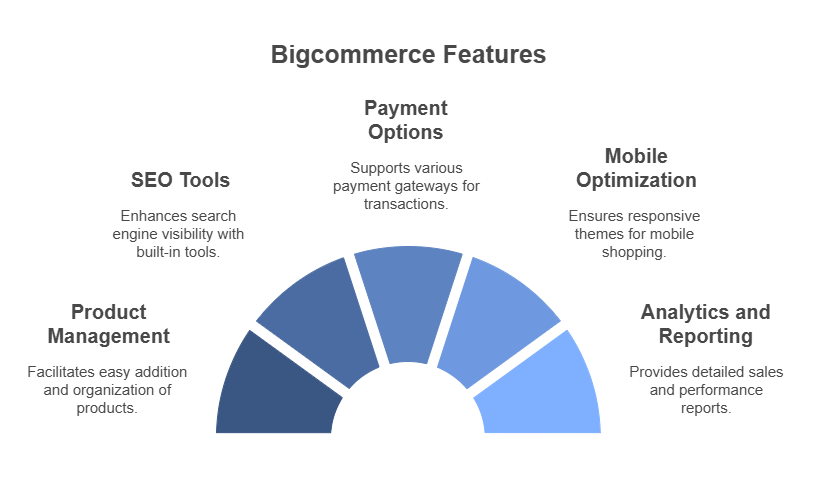
Key Features
BigCommerce offers many features to help online stores succeed.
Here are some key features:
- Product Management: Easy to add, organize, and manage products.
- SEO Tools: Built-in tools to improve search engine rankings.
- Payment Options: Supports multiple payment gateways like PayPal and Stripe.
- Mobile Optimization: Responsive themes for mobile shopping.
- Analytics and Reporting: Detailed reports to track sales and performance.
- Security: PCI compliance and secure payment processing.
- Customer Support: 24/7 support via chat, email, and phone.
Pros And Cons
BigCommerce has many advantages and some disadvantages. Here is a summary:
| Pros | Cons |
|---|---|
| Easy to use interface | Higher pricing plans |
| Scalable for growing businesses | Easy-to-use interface |
| Multiple payment gateways | Limited free themes |
| Strong SEO tools | Extra costs for some apps |
| Excellent customer support | Transaction fees on lower plans |
Consider these factors when choosing BigCommerce. Its features and support can benefit many online stores. But the cost and learning curve might be a challenge for some.
Squarespace
Squarespace is a top choice for e-commerce website builders. It offers customizable templates and easy-to-use tools. Perfect for beginners and small businesses.

Squarespace is a popular choice among e-commerce website builders. It offers beautiful templates and a user-friendly interface. Many small business owners and creative professionals prefer Squarespace for its design flexibility and ease of use. This platform helps you build a professional online store without needing advanced technical skills.
Key Features
Squarespace provides a variety of features to enhance your online store. Its drag-and-drop editor allows you to customize your site easily. You can choose from a wide range of designer templates. These templates are mobile-optimized, ensuring your store looks great on any device.
The platform includes built-in SEO tools to help improve your site’s visibility on search engines. It also offers powerful analytics to track your store’s performance. You can use these insights to make informed decisions about your business.
Squarespace supports multiple payment methods. You can accept payments through major credit cards, PayPal, and Apple Pay. This flexibility makes it convenient for your customers to complete their purchases.
Pros And Cons
Squarespace has several advantages. Its templates are visually appealing and customizable. You don’t need coding skills to build a beautiful and functional website. The platform’s drag-and-drop editor is intuitive and easy to use.
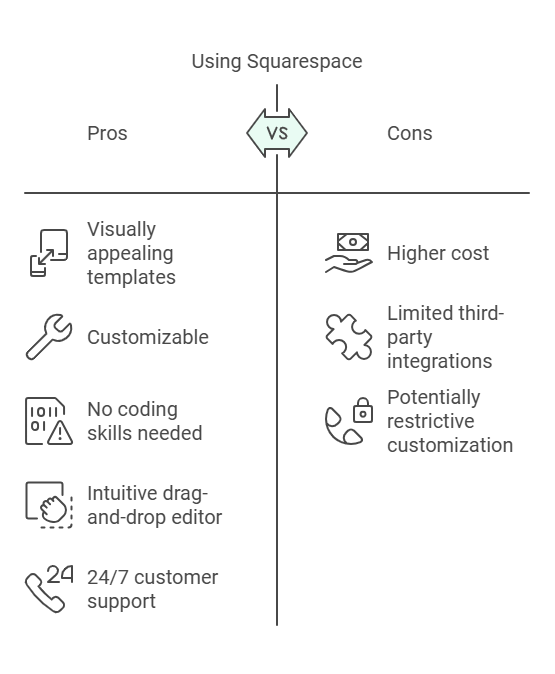
Squarespace also provides reliable customer support, available 24/7. On the downside, Squarespace can be more expensive than some other e-commerce website builders. Its pricing plans may not be suitable for businesses on a tight budget. The platform also has limited integration options with third-party apps.
This limitation might be restrictive for some users. Additionally, the customization options, while extensive, may not satisfy advanced users who require more control.
Woocommerce
WooCommerce is a popular plugin for WordPress. It turns your website into a powerful eCommerce store. Over 5 million websites use WooCommerce. It is flexible and easy to use. Let’s explore its features, pros, and cons.
Key Features
- Free to Use: The core plugin is free. Additional features may cost.
- Customizable: Thousands of themes and plugins. Tailor your store to your needs.
- Payment Options: Supports many payment gateways. Examples are PayPal and Stripe.
- Product Management: Easy to add, edit, and manage products.
- SEO Friendly: Built on WordPress. Optimized for search engines.
Pros And Cons
| Pros | Cons |
|---|---|
| Requires WordPressCan be complex for beginnersAdditional costs for some features performance may slow with many plugins | Requires WordPressCan be complex for beginnersAdditional costs for some featuresPerformance may slow with many plugins |
Comparing Builders
Choosing the best e-commerce website builder can be challenging. There are many factors to consider. Let’s compare some top builders. We’ll look at the ease of use, customization options, and pricing.
Ease Of Use
Ease of use is vital for non-tech-savvy users. Here’s a comparison:
| Builder | Ease of Use |
|---|---|
| Shopify | Very easy with a user-friendly interface. |
| Wix | Drag-and-drop simplicity. No coding required. |
| WooCommerce | Requires WordPress knowledge. Steeper learning curve. |
Customization Options
Customization allows you to make your site unique. Here’s how each builder fares:
- Shopify: Offers many themes and apps. Limited code editing.
- Wix: Highly customizable with drag-and-drop. Great for unique designs.
- WooCommerce: Full control with WordPress. Extensive plugin library.
Pricing
Pricing is a crucial factor. Below are the starting prices for basic plans:
| Builder | Monthly Price |
|---|---|
| Shopify | $29/month |
| Wix | $23/month |
| WooCommerce | Free (hosting costs extra) |
Consider your budget and needs before making a decision.
Tips For Success
Building an e-commerce website can be daunting. Success depends on several factors. Here are essential tips to ensure your e-commerce site thrives. Focus on design, SEO, and user experience.
Design Best Practices
A clean, simple design is essential. Avoid clutter. Use high-quality images. Ensure your site looks professional. Make your brand stand out. Use consistent colors and fonts. This creates a cohesive look. Prioritize mobile-friendly design. Many users shop on their phones.
A responsive design improves user satisfaction. Also, keep navigation intuitive. Users should find products easily. A good layout helps customers stay longer.
Optimizing For Seo
SEO is critical for visibility. Start with keyword research. Use relevant keywords in product titles and descriptions. This helps search engines find your site. Write unique, informative product descriptions. Avoid duplicate content. Add alt text to images.
This improves image search rankings. Use clean URLs. Include keywords in the URL. A fast-loading site also ranks better. Use caching and compress images to speed up your site.
Enhancing User Experience
Make the checkout process simple. Reduce the number of steps. Offer multiple payment options. This increases conversions. Provide excellent customer service. Quick responses build trust. Use live chat for instant help. Add customer reviews. They influence buying decisions. Ensure easy returns.
A clear policy reassures customers. Finally, keep your site secure. Use SSL certificates. Protect customer data. Security boosts trust and sales.
Frequently Asked Questions
What Is An Ecommerce Website Builder?
An ecommerce website builder is a tool that helps you create an online store. It simplifies the process by providing templates, design tools, and features like payment gateways.
Which Ecommerce Website Builder Is Best For Beginners?
Shopify is often recommended for beginners. It offers an intuitive interface, comprehensive support, and numerous templates that make setup easy.
How Much Does An Ecommerce Website Builder Cost?
Costs vary but typically range from $20 to $300 per month. Pricing depends on features, scalability, and level of customization offered.
Do Ecommerce Website Builders Offer Mobile Optimization?
Yes, most ecommerce website builders offer mobile-optimized templates. This ensures your store looks good and functions well on mobile devices.
Conclusion
Choosing the best ecommerce website builder is crucial for your online store. Each option has unique features and benefits. Think about your needs, budget, and skills. Make sure the builder supports your business goals. Research and test different builders before deciding.
This way, you can create a user-friendly and successful online shop. Happy building!

